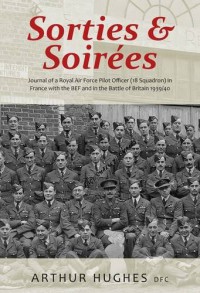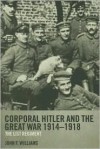Currently reading
A COMBAT PILOT'S LIFE IN 'PHONEY WAR' FRANCE

There are very few accounts from Royal Air Force (RAF) personnel who served in France during the 'Phoney War' period of World War II which lasted from September 1939 to May 10, 1940. That is why this wartime journal by Arthur Hughes - who was a newly minted RAF pilot posted to France in October 1939 - is priceless. He provides the reader with some very revealing details on relationships and experiences his squadron had with their French allies, military and civilian alike.
Hughes' squadron - which flew Bristol Blenheim twin-engined planes - was tasked with flying photo reconnaissance missions over Germany and along the Franco-German frontier directly facing France's Maginot Line, which stood as a defensive fortification against a possible frontal German attack on France itself. From the descriptions Hughes gives in his journal, one gets the impression that these missions were casually carried out by whichever crews in his squadron were chosen at a particular time for the job. And the more I read about the goings-on of life as experienced by Hughes and his squadron mates, the more I was reminded of Derek Robinson's novel, 'A Piece of Cake' which depicted life in a RAF Hurricane fighter squadron in France during the same period of Hughes' service there. The eccentricities of Hughes' commanding officers, the wild, riotous parties his squadron sometimes engaged in (replete with lots of alcohol) that took place in the cities and villages where RAF units were based, and casual and personal interactions with the French in their midst help to give the reader a tangible sense of the impatience and weariness both British and French people in France had at that time to have the war over and done with - so as to avoid massive bloodshed. The echoes of the First World War hung heavy in the air for British and French alike.
Starting with May 10, 1940, the full force of the German Blitzkrieg on France and the Low Countries soon overtakes Hughes' squadron. The pace of life abruptly takes on a maddening, desperate urgency. But for Hughes, as his journal entry for May 12, 1940 bears out, he shows a remarkable calmness --- "I am not really panic stricken, but at intervals a horrid fear seems to seep into my entrails and my stomach grows hollow. Mostly I carry on the normal activities of life without worrying or even thinking. This human capacity to forget, or rather to ignore, unpleasant facts is a divine gift and never has it been so welcome. Entangled with this fear is a surge of excitement at the thought of action at last, which is, I fear, tinged with a modicum of blood lust: the urge to kill. Curiosity too is there, curiosity just to know what it is like. And of course, personal vanity, with its illusion of superiority to others, helps to create the illusion of invulnerability: it can't happen to me."
A few months later, after Hughes' squadron is compelled to leave its French base and is, by stages, evacuated to the UK, he makes the following entry on July 19, 1940:
"Jones is dead; the gay, smiling, beautiful youth was practicing formation flying this morning, the formation broke up and he did not return. Witnesses say that he spun in. With him went Webster, a new observer, keen, a mouse with the heart of a lion and quite the most promising youngster. That such children - Jones was 19, Webster 20 - should come unscathed through shot and shell only to fall victims to an error of judgment is ironic to say the least. That such passion for living, such frank and delirious delight in life, love and laughter should be wiped out in an instant is tragic. Thrusting these young men into battle with inadequate training is a damned tragedy. Jones was obviously not fully competent on Blenheims; he came back from a raid on Tuesday, ran short of petrol, jettisoned his bombs in the fields near Hatfield and made a forced landing near Welwyn Garden City: the aircraft burned. Why this futile waste?"
"Sorties and Soirées" comes highly recommended as a book that offers the reader an unflinchingly honest account of the life of an RAF pilot officer in France during the early months of World War II. Hughes would go on to have a long war.













